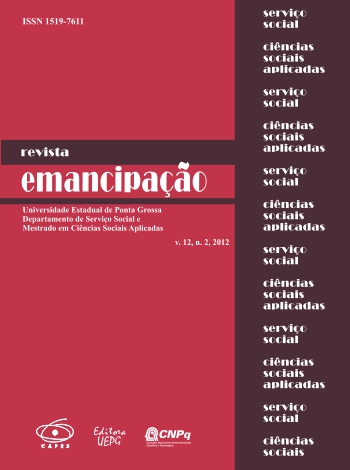(Civil society in Hegel and Marx) Doi: 10.5212/Emancipacao.v.12i2.0006
Main Article Content
Abstract
Civil society, a not too recurrent theme in the tradition of modern political thinking, begins to gain a philosophical status with Hegel and Marx’s reflections. The civil society theme appears, both in their philosophical and political reflections, as a theme associated with reflections about the modern State. Both authors aim at understanding, at the beginning of modern age, the contradiction between State and civil society, or between universal and individual, man and citizen, bourgeois and citoyen, political and social. On the one hand, Hegel sees the State as an “ethical” being overcoming the world’s contradictions on the needs of the civil society. Marx, on the other hand, when analyzing the Hegelian conception of State, criticizes him and tries to “unconsecrate” this conception; hence Marx’s argument that both civil society and State should vanish, so that men can reconcile with themselves. However, the solutions presented by both thinkers for the contradiction pointed out between State and civil society are prone to criticism, since Hegel points towards totalitarianism and Marx towards a kind of messianism.
Downloads
Article Details

This work is licensed under a Creative Commons Attribution 4.0 International License.
Autores que publicam nesta revista concordam com os seguintes termos:
a) Os autores mantém os direitos autorais e concedem à revista o direito de primeira publicação, com o trabalho simultaneamente licenciado sob a Creative Commons Attribution License (https://creativecommons.org/licenses/by/4.0/deed.pt_BR) que permite o compartilhamento do trabalho com reconhecimento da sua autoria e publicação inicial nesta revista.
b) Esta revista proporciona acesso público a todo o seu conteúdo, uma vez que isso permite uma maior visibilidade e alcance dos artigos e resenhas publicados. Para maiores informações sobre esta abordagem, visite Public Knowledge Project, projeto que desenvolveu este sistema para melhorar a qualidade acadêmica e pública da pesquisa, distribuindo o OJS assim como outros softwares de apoio ao sistema de publicação de acesso público a fontes acadêmicas. Os nomes e endereços de e-mail neste site serão usados exclusivamente para os propósitos da revista, não estando disponíveis para outros fins.
This journal provides open any other party.
Esta obra está licenciada sob uma Licença Creative Commons.
https://creativecommons.org/licenses/by/4.0/deed.pt_BR.

References
BECCHI, P. Distinciones acerca del concepto hegeliano de sociedad civil. Revista Doxa – 14. Disponível em, www.cervantesvirtual.com/portal/doxa/isonomia.shtml,1993, Acessado em: 10/2004.
BOBBIO, N. Estudos sobre Hegel: direito, sociedade civil, Estado. 2a. Ed. S.P: UNESP: Brasiliense, 1995.
_____.O conceito de sociedade civil. Rio de Janeiro: Graal, 1982.
_____.Ni con Marx ni contra Marx. México. Fondo de Cultura Económica, 1999.
_____.; BOVERO, M. Sociedade e Estado na filosofia política moderna. S.P, Ed. Brasiliense, 1986.
_____. et al. Dicionário de política. Brasília: UNB, São Paulo: Imprensa Oficial do Estado, 2002, 12a ed., v.1 e 2.
BODEI, R. Macchine, astuzia, passione: “per la genesi della società civile in Hegel”. In: Filosofia e società in Hegel. Trento: Quaderni di verifiche, 1977, Anno VI - nº 2, p. 61-89.
BORON, A. Estado, capitalismo y democracia en América latina. Colección Secretaria Ejecutiva, Clacso, Consejo Latinoamericano de Ciencias Socilaes, Ciudad de Buenos Aires, Argentina. Agosto 2003, p. 320. Disponible en: http:/bibliotecavirtual. Clacso.org.ar/ar/libros/estado/prologos.pdf
CHÂTELET, F. Uma história da razão: entrevistas com Émile Noël. R. J: Jorge Zahar Editor, 1994.
FOUCAULT, M. “Omnes et singulatim: para uma crítica da razão política”. In: Estrategia, poder-saber. Vol. iv, Rio de Janeiro: Forense Universitária, 2003
HARDT, M. O desaparecimento da sociedade civil. Trad. de Selvino José Assmann. In:http://www.deriapprodi.org/rivista/l/hardt17.html, 2001, Acessado em: 2005.
HEGEL, G. W. F. Linhas fundamentais da filosofia do direito. Trad. de Marcos Lutz Müller, Campinas, São Paulo, IFCH/UNICAMP, textos didáticos nº. 32 – Maio, 1998.
_____.Linhas fundamentais da filosofia do direito. Trad. de Marcos Lutz Müller, Campinas, São Paulo, IFCH/UNICAMP, textos didáticos nº. 21 – Setembro, 2000.
HYPOLLITE, J. Saggi su Marx e Hegel. Milano: Editrice Valentino Bompiani, 1965.
LIGUORI, G. “Estado e sociedade civil: entender Gramsci para entender a realidade”. In: COUTINHO, C. N. & TEIXEIRA, A. P. (orgs.). Ler Gramsci, entender a realidade. RJ: Civilização Brasileira, 2003, p. 173-188.
LEFEBVRE, J-P. & MACHEREY. Hegel e a sociedade civil. São Paulo: Discurso Editorial, 1999.
LOSURDO, D. Hegel, Marx e a tradição liberal, liberdade, igualdade, Estado. São Paulo, Editora UNESP, 1998.
MANACORDA, M. “Do liberalismo ao comunismo”. In: Perspectiva. Florianópolis, v. 19, n.2, p. 271-293, jul./dez. Trad. de Celso J. Carminati e rev. de Selvino J. Assmann, 2001.
MARX, K. Crítica da filosofia do direito de Hegel. Trad. São Paulo: Boitempo, 2005.
_____.A questão judaica. São Paulo: Centauro, 2002.
_____.Teses sobre Feuerbach. São Paulo, Martins Fontes, 1998.
_____.Glosas críticas marginais ao artigo “O rei da Prússia e a reforma social”. De um prussiano. In: Revista práxis, Belo Horizonte, Projeto Joaquim Oliveira, nº 5, 1995, Out-Dez.
MÉSZAROS, I. Filosofia, ideologia e ciência social, ensaios de negação e afirmação. São Paulo: Ensaio, 1993.
MARINI, G. “Struttura e significati della società civile hegeliana”. In: Il pensiero politico di Hegel, a cura di Claudio Cesa, Roma, Editori Laterza, 1979.
POPPER, Karl. A sociedade aberta e seus inimigos. São Paulo: Edusp, 1998.
RAMOS, C. A. Liberdade subjetiva e Estado na filosofia política de Hegel. Curitiba: Ed. da UFPR, 2000
WEBER, T. Hegel, liberdade, Estado e história. Petrópolis, RJ: Vozes, 1993.
RIEDEL, M. et al. “Dialéttica nelle istituzioni. Sulla struttura storica e sistematica della filosofia del diritto di Hegel”. In:Filosofia e società in Hege. Quaderni di verifiche, 1977, Anno VI - nº 2.

